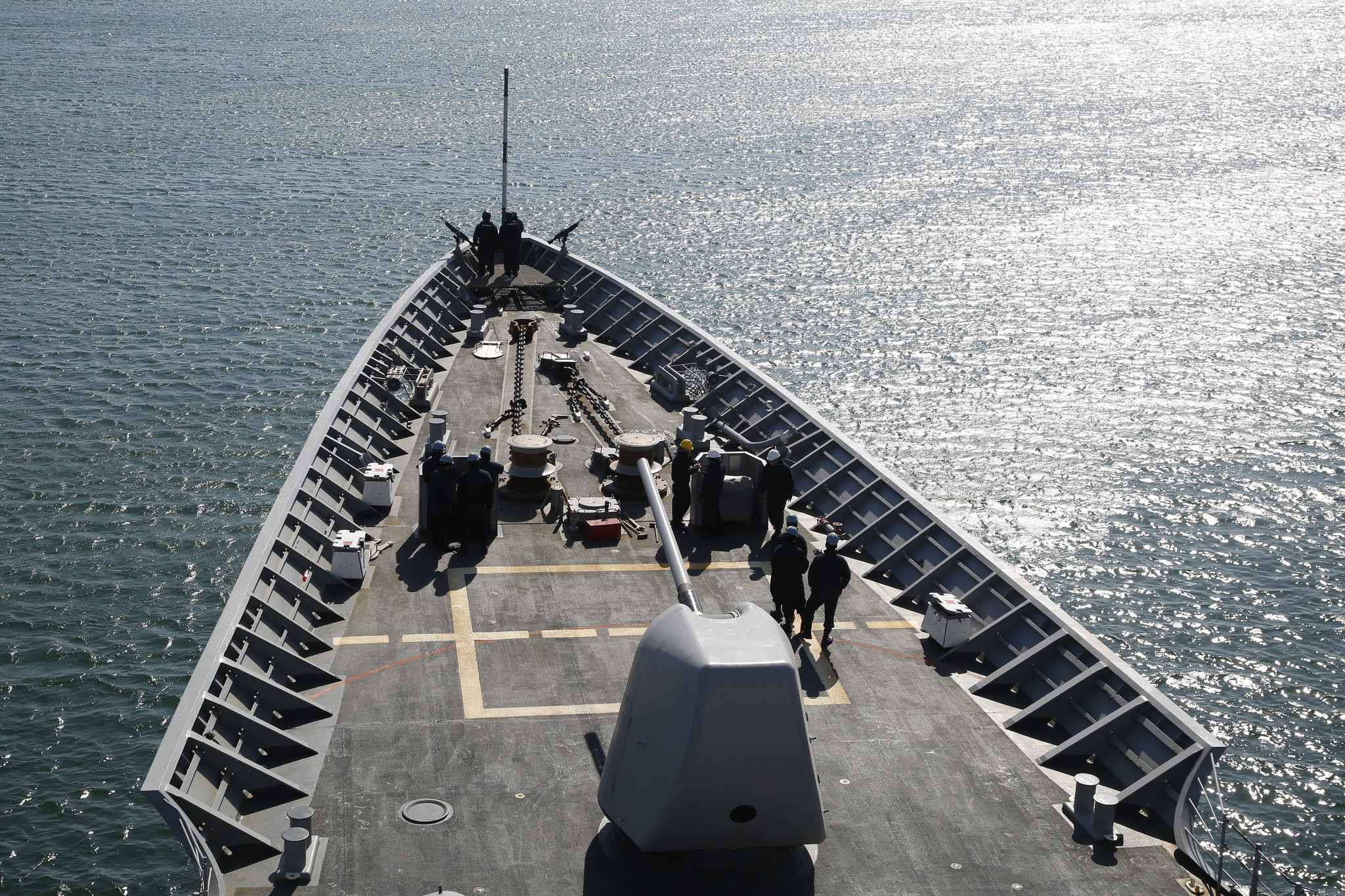Russia’s Illegal Restriction of Navigation in the Black Sea
As Russia escalates its efforts to destabilize Ukraine, it has increased tensions and put the region on heightened alert by illegally closing portions of the Black Sea to all foreign warships and other state vessels.

Published by The Lawfare Institute
in Cooperation With

Russia recently announced that it was closing off portions of the Black Sea off the Crimean Peninsula and near the Kerch Strait to foreign warships and other state vessels from April 24 to Oct. 31. The announcement was immediately condemned by both Kyiv and Washington. U.S. State Department spokesperson Ned Price expressed deep concern over Moscow’s declaration, denouncing the move as another unprovoked escalation in Russia’s ongoing efforts to undermine and destabilize Ukraine. The closures come at a time when Russia is significantly building up its forces in Crimea and around the Ukrainian border on a scale not seen since it invaded Crimea in 2014, although there are reports that the Kremlin has ordered the withdrawal of some of its troops from the border.
Closure Areas in the Black Sea
All ships, including warships and other state vessels, enjoy a right of innocent passage through foreign territorial seas under Article 17 of the U.N. Convention on the Law of the Sea (UNCLOS). A passage is innocent if it is not prejudicial to the peace, good order or security of the coastal state. A passage is considered to be prejudicial to the peace, good order or security of the coastal state if a ship engages in one of the activities listed in Article 19, such as intelligence collection and weapons exercises.
The coastal state may adopt laws and regulations relating to innocent passage, which conform to international law, for the reasons specified in Article 21, but, under Article 24, these laws and regulations cannot hamper, deny or impair the right of innocent passage. Under Article 25, the coastal state may, however, take the necessary steps in its territorial sea to prevent passage that is not innocent. In addition, Article 25 allows the coastal state, without discrimination in form or fact among foreign ships, to suspend temporarily in specified areas of its territorial sea the innocent passage of foreign ships if such suspension is essential for the protection of its security, including weapons exercises. The suspension will take effect only after it has been duly published.
The authority of the coastal state to suspend innocent passage, however, is not unlimited. On April 24, Russia announced that it was closing off portions of the Black Sea to foreign warships and other state vessels 24/7 for a period of six months. Russia’s announced closure is problematic for several reasons. First, under UNCLOS, the suspension of innocent passage must be temporary. The combination of a closure that extends 24 hours a day, 7 days a week, for six months is not considered temporary. Second, the suspension cannot discriminate in form or fact among foreign ships. Russia’s declaration applies only to warships and other state vessels and therefore discriminates in fact among types of foreign ships. Third, the suspension of innocent passage must be essential for the security of the coastal state. Russia has not publicly indicated why it is closing off portions of the Black Sea. In short, Russia’s purported suspension of passage to foreign warships and other state vessels operating off the coast of Crimea appears inconsistent with international law.
To the extent that the closure area extends beyond the 12 nautical mile boundary of its territorial sea, the Worldwide Navigational Warning Service states that Russia may establish temporary warning areas only to advise ships and aircraft that it is conducting activities beyond its territorial sea that may pose a hazard to navigation and overflight. Such warning areas are not exclusion zones. Ships and aircraft retain the right to transit through these zones recognizing that there is an increased risk in doing so. Beyond the territorial sea, under UNCLOS Article 89, no state may subject any part of the high seas, including the exclusive economic zone (EEZ), to its sovereignty. Seaward of the territorial sea, all ships and aircraft enjoy high seas freedoms of navigation and overflight and other internationally lawful uses of the seas related to these freedoms, including military activities. To the extent the Russian closure area purports to close portions of the Black Sea that are beyond the 12 nautical mile boundary, it is inconsistent with international law.
Kerch Strait
The current Russian Notice to Mariners blocks access to the Kerch Strait, which connects the Black Sea to the Sea of Azov. This closure violates the 2003 bilateral agreement between Russia and Ukraine, which recognizes the importance of the Sea of Azov and the Kerch Strait to the economic development of both Ukraine and Russia. The treaty notes that all disputes concerning the Azov-Kerch area of water should be resolved peacefully. Article 2 of the agreement acknowledges that the Sea of Azov features both Russian and Ukrainian ports and recognizes that Russian and Ukrainian flagged ships enjoy freedom of navigation through the Kerch Strait and within the Sea of Azov. It also recognizes freedom of navigation for foreign flagged commercial ships transiting the strait to or from a Russian or Ukrainian port within the Sea of Azov, as well as for foreign flagged warships transiting to such a port with the permission of either Russia or Ukraine. Russia’s unilateral and abrupt closure of the Kerch Strait blocks Ukraine’s access to two of its strategic ports in the Sea of Azov, without consultation with Ukraine, in violation of Russia’s obligations under the bilateral agreement.
Although the status of the Kerch Strait is unsettled, we suggest Russia’s closure of the strait violates Article 38 of UNCLOS because the Kerch Strait is considered a strait used for international navigation under Article 37. The strait is completely overlapped by the territorial seas of Ukraine and Russia and connects two areas of EEZs in the Sea of Azov and the Black Sea. It is also used extensively by ships engaged in international trade, logging nearly 19,500 transits in 2017. The waterway, therefore, meets both the geographic and functional criteria of an international strait where the right of transit passage applies. Article 44 stipulates that coastal states may not suspend transit passage. Thus, Russia’s closure of the strait and access to the Sea of Azov is in contravention of UNCLOS if the Kerch Strait is governed by the transit passage regime. Two of the principal users of the strait—Ukraine and members of the European Union—agree that the right of transit passage applies in the Kerch Strait.
Kerch Strait passage is further complicated by Russia’s illegal construction of the Kerch Bridge in 2018 across the strait, which connects mainland Russia and the Crimean Peninsula. The bridge’s span limits the height of vessels that may enter the strait and is controlled entirely by Russia, thereby impeding transits. In 2018, Russia employed the bridge and a large container ship to block Ukrainian vessels from entering the strait, triggering a military confrontation that spurred legal cases filed by Ukraine at the International Tribunal for the Law of the Sea and the Permanent Court of Arbitration. The European Union and the United States have denounced the illegal construction of the bridge and in October 2020 and April 2021 they imposed additional sanctions on Russian entities and individuals tied to the construction of the bridge.
The European Parliament asserted in a 2018 resolution that transit passage applies through the Kerch Strait. The resolution condemns the construction of the Kerch Bridge and the laying of underwater cables in the strait without the consent of Ukraine as a clear violation of Ukraine’s sovereignty and territorial integrity. Specifically, the bridge limits the size of ships that can transit the strait to an air draft of less than 33 meters and a length of less than 160 meters. This means that Panamax-class vessels, which accounted for more than 20 percent of all ship traffic through the strait before the construction of the bridge, now cannot enter the Sea of Azov. The resolution additionally condemns Russia’s practice of blocking and inspecting Ukrainian and foreign-flagged commercial vessels going through the strait, including more than 120 ships registered in the European Union, which were bound to or from Ukrainian ports. The European Parliament views Russia’s actions as a breach of international maritime law, and it condemned the illegal construction of the Kerch Bridge and Russia’s infringement of navigational rights, which hamper the right of transit passage through the strait.
As one of the bordering states, Ukraine also maintains that the transit passage regime applies to the Kerch Strait. On Sept. 16, 2016, Ukraine served Russia with a Notification and Statement of Claim under Annex VII to UNCLOS referring to a dispute concerning coastal state rights in the Black Sea, Sea of Azov and Kerch Strait. In its memorial, Ukraine requested the Arbitral Tribunal to adjudge and declare that, inter alia, Russia violated UNCLOS, Article 2, through its unauthorized and unilateral construction of submarine power cables, a submarine gas pipeline and the Kerch Bridge across the Kerch Strait; and that Russia violated UNCLOS, Articles 38 and 44, by impeding transit passage through the Kerch Strait. Regarding the status of the Sea of Azov and the Kerch Strait, Ukraine specifically denies that it had treated these waters as common internal waters either before or after the execution of the 2003 agreement. Rather, Ukraine asserts that it has applied the regime of transit passage to the strait, as reflected in a 2001 note verbale and 2002 note verbale (paragraph 242). On this basis, Ukraine requested the Arbitral Tribunal to order the Russian Federation to, inter alia, provide Ukraine with appropriate public assurances and guarantees that Russia would not hinder transit passage through the Kerch Strait.
Annexation of Crimea
Russia’s current closure areas in the Black Sea and control of the Kerch Strait are tactics tied to its ongoing occupation and annexation of Crimea. In 2014, Russia illegally invaded and annexed Crimea in violation of Article 2(4) of the U.N. Charter. Russia’s continued occupation of Ukrainian territory contravenes international law and the 1994 Budapest Memorandum, in which Russia pledged to respect the “independence and sovereignty and the existing borders of Ukraine.” The memorandum also requires Russia to refrain from the “threat or use of force against the territorial integrity or political independence” of Ukraine.
Ukraine, the United States and the European Union do not recognize the Russian annexation of Crimea and view the ongoing Russian presence in and control of the region as an illegal occupation in violation of Ukraine’s sovereignty and international law. Similarly, the Council of Europe indicated that the referendum organized in Crimea in March 2014 was unconstitutional under both the Crimean and Ukrainian constitutions and that the outcome of the referendum and Russia’s illegal annexation of Crimea have no legal effect. The Russian occupation of Crimea has likewise been condemned by the OSCE Parliamentary Assembly. Given that Russia does not have a lawful territorial claim to Crimea, it lacks legal authority to close the territorial sea of Ukraine off the coast of Crimea. And under Article 2 of the U.N. Charter, Ukraine has complete sovereignty over its territorial sea. Russia’s purported closure of the Black Sea off the coast of Crimea constitutes a threat or use of force against the territorial integrity and political independence of Ukraine, in violation of Article 2(4) of the U.N. Charter.
Conclusion
The international community cannot acquiesce to continued encroachment of Ukrainian sovereignty and escalating Russian aggression in the Black Sea region. Ukraine’s sovereignty over its territorial seas and access to its ports in the Sea of Azov are just as critical to its national security as is its sovereignty over Crimea. Access to the Kerch Strait, as well as freedom of navigation throughout the Black Sea, are essential to the security of the Black Sea states, all European nations and the United States. Notwithstanding the serious economic impacts of hampering navigation in the Black Sea and access to the Sea of Azov, the Russian closure areas limit military operations of the United States and its European and NATO allies. Russia is violating international law and its own regional agreements regarding the status of Ukraine’s sovereign territory, the Kerch Strait and the Sea of Azov. There should be greater consequences for these actions.
The ongoing arbitration may reinforce Ukraine and the international community’s criticism of Russia’s illegal actions, generate further diplomatic costs and increased sanctions, and spur increased naval deployments to the region and freedom of navigation assertions by the United States and NATO. These responses to aggression exert greater pressure on Russia and reinforce the rule of law and freedoms of navigation and overflight in the Black Sea region. Russia is a bully, and the only way to stop a bully is to confront it. NATO must take a firmer stance against Russia and compel Moscow to unwind its war against Ukraine.






